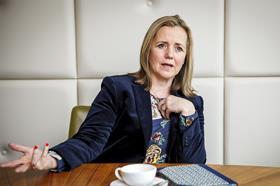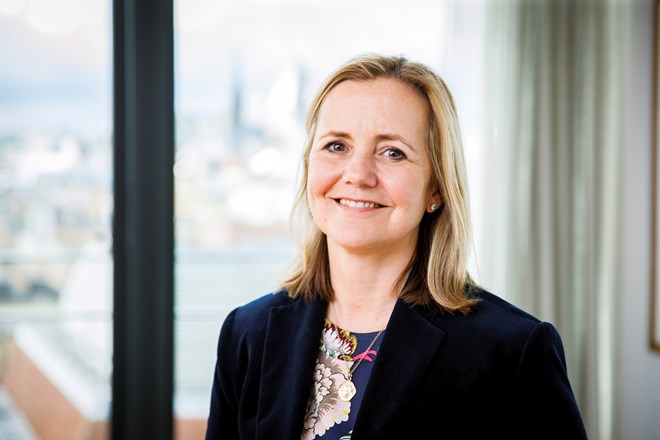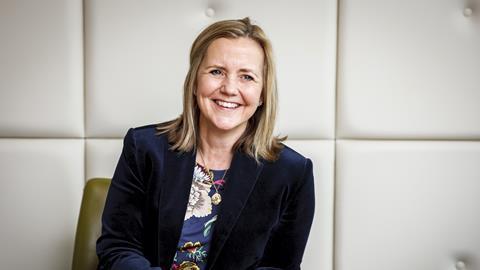In 27 years at Freshfields Claire Wills has risen to become the magic circle’s most senior woman. And this after a childhood marred by upheaval, hears Jonathan Rayner.
BIOG
EDUCATION
Read law at the University of Liverpool (1987-1990)
College of Law, Chester (1990-1991)
CAREER
Freshfields, articled clerk (1992–1994)
Freshfields, partner (2001-)
Freshfields, co-head of global financial institutions sector (2014-)
Freshfields, managing partner (2019-)
KNOWN FOR
Became managing partner of Freshfields London in February 2019
From Liverpool to Hong Kong, Moscow and Shanghai, new Freshfields Bruckhaus Deringer London managing partner Claire Wills has stretched her horizons – and the horizons of women lawyers generally – in ways that she could never have foreseen.
The only woman presently to hold such a senior managerial role in a magic circle firm, Wills was born on Merseyside, where she was one of four children ‘dragged up’ by their widowed mother. She attended several Liverpool schools, ‘losing the equivalent of a whole term’s study with every change of school’, she says, quoting the accepted wisdom of educationalists. And yet despite that early disadvantage, she secured a place at the University of Liverpool to read law.
She lived at home during her university days, making it seem improbable that she would ever escape her roots. But escape she did, beginning with a year at the College of Law, Chester (now the University of Law Chester). It was on leaving there and becoming a trainee at Freshfields that her life and career began its upward – and ultimately stellar – trajectory, culminating in her appointment as London managing partner in February 2019.
Wills now oversees an office that has 136 partners and more than 500 lawyers. In addition to her new role as managing partner, she remains global co-head of financial institutions. This is the group that advises the world’s leading banks, asset managers, insurers and market-infrastructure providers on their business-critical projects. It also advises financial institutions on the impact that financial technology (fintech) and the broader digitisation of financial services are having across the sector.

Her elevation did not pass unnoticed. ‘I received emails from women lawyers who I don’t even know saying how thrilled they are that one of their number has got the top job,’ Wills recalls. ‘After all, just 23% of London partners are women.’ Was it a breakthrough moment in law firm diversity? ‘Our London management group has lots of women,’ she replies. ‘We have women holding down the roles of chief financial officer, chief operating officer and human resources director, for instance, but I’m the first female managing partner.’
But we race ahead. Let us begin at the beginning. Wills tells the Gazette that, although nobody in her family had entered a profession, she decided to become a lawyer at the age of seven. ‘I used to be ill a lot and off school and so would watch Crown Court on the television.’ The TV series ran from 1972 until 1984 and was screened in the early afternoon. ‘History has repeated itself,’ she adds. ‘My son has been attracted to the law because of Suits.’ This is the US legal drama that featured, among others, Meghan Markle prior to her leaving the show to marry Prince Harry.
Her childhood ambition was fulfilled when she joined Freshfields as an articled clerk in March 1992. ‘I was in my mid-twenties and from Liverpool,’ she recalls. ‘It was 27 years ago and there I was in a new age, futuristic building on Fleet Street with its vast atrium.
‘It was so exciting to be joining a global law firm with all the potential to travel. And the job just got more international and more global as time passed. I’ve worked on deals all over the world. I did two stints living and working in Hong Kong. I travelled back and forth to Moscow while part of the team advising Barclays on the disposal of Barclays Bank Russia. And as recently as a week or so ago, I was in Shanghai.’
Had she set her sights on becoming managing partner from day one at her desk? ‘It hadn’t crossed my mind,’ replies Wills, ‘although on my first day I did ask the associate who was supervising me how long it takes to become a partner. He said it was very difficult and, in fact, he never became a partner at Freshfields, but left to become one at another firm. But when someone tries to rule out something for me, it just makes me more determined. My technique was to focus on my job and do the best I could.’
It was a technique that bore fruit. She became part of the corporate and mergers & acquisitions (M&A) department, working mainly with financial institutions such as insurance companies, banks and asset managers. She also built enduring relationships with some of the firm’s retail clients, most prominently multinational supermarket chain Tesco. Her efforts were rewarded in May 2001 when she became a partner.
What is her secret to striking the best deals? ‘You need to be able to read the room and see where the other side is coming from. The best deals are those where both sides think they’ve got a good deal. There’s no profit in point-scoring. When doing a transaction, there are always highs and lows. Your role is to support your clients, particularly through the lows, and always bearing in mind that what’s routine for us – such as an M&A – is likely to be a first time for the clients. I try to deliver positivity, with clients being part of the team.
‘But you have to be aware that deals have a momentum of their own. They can shift from going along steadily to abruptly becoming very intense. We had an all-night session working on a deal as recently as January of this year, for example.’
On the move
Next year Freshfields is relocating from its iconic address on Fleet Street to Bishopsgate, in the City of London. Why the move? Says Wills: ‘I was initially devastated by the decision to move. After all, I like the location and, speaking sentimentally, I’ve always worked here. But now I’m excited about the new building. I’ve also come around to thinking that junior partners and others will be working here for the next 20 or so years, so it makes sense that they, and not my generation, should make the decision.

‘We’ve been here a long time – I’ve personally been here 27 years – and the passage of time has taken its toll. The challenge of getting the Fleet Street office up to the right standard for the new technology is so huge that we would have to move out temporarily – except we can’t find suitable alternative premises. And so I now welcome the opportunity to modernise how we do things and get ourselves up and ready for the next 27 years with bespoke floor plans designed specifically for us. There is still a lot to be done, but we expect to move during the second half of 2020.’
Wills worked on Tesco’s £3.7bn merger with Booker in a deal that was very much in the public eye. This is because Booker is not only the UK’s largest cash and carry wholesaler, it is also the owner of the Premier, Londis and Budgens convenience store brands with some 5,000 sites throughout the country. How did Wills become Freshfields’ relationship partner with Tesco and did the deal pose any particular challenges?
She replies: ‘[Former Freshfields corporate head] Barry O’Brien was one of my unofficial mentors – or sponsors, as we would call it nowadays – and he brought me on to the Tesco team. He told Tesco that I’d do an amazing job and they trusted him. Barry is an excellent lawyer in so many ways. Bringing another lawyer into the relationship with Tesco was exactly the right thing to do.
‘The deal did pose certain challenges. It was a reflection of market conditions, but public M&A had dwindled and nobody had done any for some time. We needed to field a team with experience of public M&A and which understood the code [the City Code on Takeovers and Mergers] in practice, not just in theory. This is where a long career in corporate law paid off, but it also gave associates the opportunity to gain experience in public M&A, which is all important.’
Since 1968, the code has been developed to reflect the collective opinion of those professionally involved in the field of takeovers. It sets standards as to how fairness to shareholders can be achieved, along with an orderly framework for takeovers. The code, which has a statutory basis in the UK, specifies how profit forecasts and asset valuations (for instance) must be reported by professional advisers. It also lays out the legal obligations incumbent upon a person or group acquiring 30% or more of a public company’s shares.
The successful merger, completed in March 2018, gave Tesco a market capitalisation of just under £20bn, making it larger than its rivals Sainsbury’s, Morrisons, Marks & Spencer and Ocado combined.
Another recent deal that Wills worked on was helping advise Aberdeen Asset Management on its 2017 all-share £11bn merger with Standard Life to become Standard Life Aberdeen. The deal between the two companies created a new entity with offices in 50 cities around the world, a global workforce of 9,000 (including 1,000 investment professionals), clients in 80 countries, a market capitalisation of over £11bn and assets under administration of £670bn.
She also helped advise Barclays on its acquisition of Standard Life Bank and Goldfish Credit Card and on its disposal of Barclays Bank Russia (the transaction which saw Wills regularly commuting to Russia).
Freshfields’ M&A practice topped the UK rankings in 2018, after advising on 60 deals worth some £112bn. It also led the European M&A rankings for the third consecutive year after acting on 177 deals worth £266bn. Can Wills explain this success? ‘Our corporate practice tends to double partners on bigger transactions,’ she responds. ‘We like partners working shoulder-to-shoulder rather than a senior partner floating about and a junior partner doing all the work.’
What of the future? Does Brexit hold any fears for Freshfields? ‘I’m confident that English law will survive Brexit as the pre-eminent law of business and commerce. That said, we still need to beat the drum about the strength of our law and not be complacent. It’s very important to be out there and making the point to our clients.’
Nobody knows for sure what is going to happen. How do you advise your clients given the uncertainty over the UK’s Brexit plans? ‘We’ve been advising clients since the referendum on the basis of a hard Brexit. My new role at Freshfields is also impacted. It’s a broad role, embracing everything from compensation [pay, including bonuses] to investment in technology, to fixing a budget. And in common with other businesses, we’re addressing these issues in something of a Brexit vacuum.’
Brexit aside, what other challenges does Wills’ new role bring? ‘I’ll be pushing hard on diversity and inclusion,’ she replies. ‘The social mobility side particularly appeals to me given my own background. I want to see diversity and inclusion become central to our recruitment process.’
She goes on to talk about the Freshfields Stephen Lawrence Scholarship scheme, which was set up in partnership with the Stephen Lawrence Charitable Trust. Lawrence was 18 when he was murdered in an unprovoked racist attack on 22 April 1993. The scheme aims to improve access to the legal profession for black and ethnic minority men from low-income households. It offers support in interview technique, mentoring and commercial familiarisation during university holidays, as well as generous cash donations towards the costs of studying.
‘We’ve still a whole heap of things to do,’ Wills says, ‘but in the meantime we want to be more open in our thinking to encourage people from less privileged backgrounds to pursue a career in the law.’
The drive for greater inclusivity goes beyond the scholarship scheme. ‘This year is the 100th anniversary of women being allowed to practise law. What are the next big changes we are going to see? To try and find the answer, we have been surveying generations X and Y to learn what they think legal services will look like in the future. [Generation X was born between 1965 and 1979, generation Y between 1980 and 1995.]
‘We’re also trying to reset communication within the firm so as to gain valuable feedback and to ensure that everyone – lawyers and business service providers alike – feel part of the team and know that their opinions are valued. We are trialling a Yammer group, which is a social networking service that can be used for private communications within organisations, for the same reason.
‘And we are having conversations with clients on how to create an inclusive workplace. Clients are leading the way on inclusiveness, demonstrating that it’s not only the right thing to do, but it’s also a business imperative.’
Photography Darren Filkins





























No comments yet